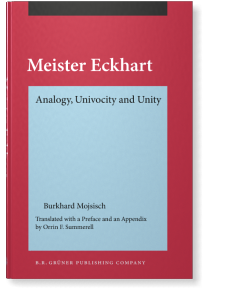Meister Eckhart
Analogy, Univocity and Unity
Meister Eckhart: Dominikanischer Theologe, Prediger, Sprachgenie, Mystiker — sein Denken fasziniert den modernen Menschen nicht zuletzt wegen der einprägsamen Wechselwirkung von scholastisch-akademischer Terminologie und deutscher Mundart. Der vorliegende Band ist die einzige englischsprachige Monographie über Meister Eckhart als Philosophen, die ihn im Zusammenhang der ihn maîgeblich bedingenden philosophischen Tradition interpretiert. Auch wenn Eckhart zurecht als Vordenker der modernen Subjektivität gilt, kann man ihn nur im bezug auf Albert den Groîen, Aristoteles, Dionysius Pseudo-Areopagita, den Liber de causis und die neuplatonische Tradition, Dietrich von Freiberg und Thomas von Aquin sowie Eckhart von Gründig, Jakob von Metz und Johannes Picardi von Lichtenberg adäquat verstehen. Im Mittelpunkt dieser Studie steht die Rückkehr der Seele — durch ihre Abgeschiedenheit vom Körperlichen, vom Mannigfaltigen und vom Zeitlichen — in ihren Grund bzw. in den Funken der Seele, wo nach Eckhart “gotes grunt mîn grunt und mîn grunt gotes grunt” ist. Der vorliegende Band revidiert nicht nur die deutschsprachige Original-Studie im Hinblick auf Debatten in der neueren Eckhart-Forschung: Auch dem Nicht-Spezialisten werden sämtliche lateinische und mittelhochdeutsche Quellen durch die Übersetzung ins Englische zugänglich gemacht.
Table of Contents
-
Translator’s Preface | p. ix
-
Abbreviations | p. xiii
-
1. Introduction | p. 1
-
2. Reason and Rational Cognition of God: The Non-relation-ality of Absolute Intellectuality | p. 25
-
3. Analogy | p. 49
-
4. Univocity | p. 67
-
5. Unity | p. 95
-
6. The Theory of the Soul | p. 129
-
Conclusion | p. 169
-
Appendix: English Translations of Latin and Middle High German Citations | p. 171
-
Literature | p. 203
-
Index Nominum | p. 217
Cited by (10)
Cited by ten other publications
This list is based on CrossRef data as of 3 july 2024. Please note that it may not be complete. Sources presented here have been supplied by the respective publishers. Any errors therein should be reported to them.
